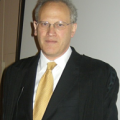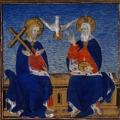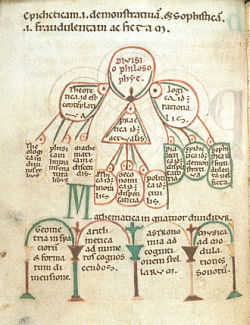211. Learn Everything: the Victorines
Hugh of Saint Victor and other scholars of the same abbey combine secular learning with spirituality.
Themes:
• J. Taylor (trans.), The Didascalicon of Hugh of St. Victor (New York: 1961).
• G.A. Zinn (trans.), Richard of St. Victor: The Twelve Patriarchs, the Mystical Ark, Book Three of The Trinity (New York: 1979).
• R. Berndt (ed.), Schrift, Schreiber, Schenker: Studien zur Abtei Sankt Viktor in Paris (Berlin: 2005).
• B.T. Coolman, The Theology of Hugh of St Victor (Cambridge: 2010).
• C.S. Jaeger, “Humanism and Ethics at the School of St Victor in the Early Twelfth Century,” Mediaeval Studies 55 (1993), 51-79.
• P. McElroy Wheeler, The Twelfth-Century School of St Victor (PhD Thesis, University of Southern California, 1970).
• P. Rorem, Hugh of Saint Victor (New York: 2009).







Comments
Preparational
Hugh of St. Victor tended more to Plato than to Aristotle, yet I experienced in his writings that he stuck closely to the Bible and the commentary of Plato's Timaeus given by Calcidius, or Cicero's translation which he mentions, too. This means, no word about Plato's story about primeval times like Atlantis. Hugh of St. Victor also just omits any hint about Greek and Roman history. His history of the world is purely biblical. Even Alexander is not mentioned. And no connection between the biblical Deluge and Deukalion's flood or the Atlantis flood, what is common with so many other authors. I assume, the meaning of the Victorines is more their preparational contribution to later scholars, like the Chartrians, who took more liberties? The didaskalion is more a book about how to learn instead of what to learn.
In reply to Preparational by T. Franke
PS
PS: Greek and Roman (and other) history is indeed mentioned in later books, yet under a strictly biblical perspective, and everything pre-deluvial is consequently ignored.
Add new comment